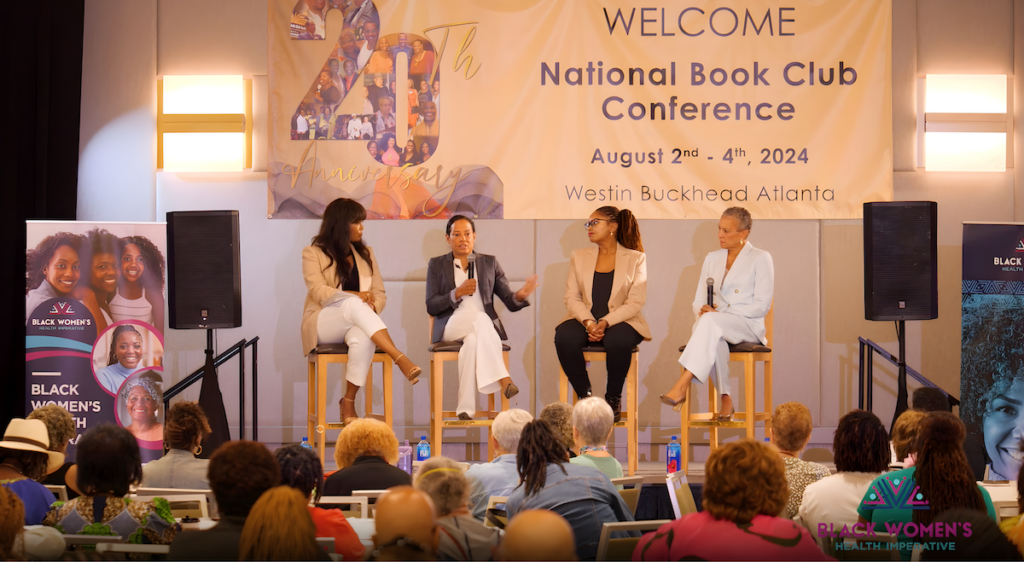
The National Book Club Conference celebrated its 20 year anniversary recently and featured a compelling session on “Stress and Black Women’s Health,” hosted by the Black Women’s Health Imperative (BWHI). This session aimed to empower Black women by addressing one of the most pressing health issues they face today—stress. Moderated by the dynamic Emmy Award-winning television personality and radio host Julie Smith, the session brought together a panel of esteemed experts: Dr. Sharon Malone, an OB/GYN and Certified Menopause Practitioner, Dr. Tené T. Lewis, an Associate Professor of Epidemiology at Emory University, and Linda Goler Blount, MPH, President of the Black Women’s Health Imperative.
Attendees were invited to complete the Perceived Stress Survey, a tool designed to help them assess their current stress levels. This interactive element not only engaged the audience but also provided a tangible starting point for understanding the impact of stress on their lives.
A key topic was the unique challenges Black women face during menopause. Dr. Sharon Malone revealed that Black women often experience menopause symptoms more severely than their white counterparts, largely due to the compounded effects of racism and gender discrimination. The panelists also addressed the myths surrounding hormone replacement therapy (HRT), offering clarity and guidance on whether it should be considered as part of a healthcare strategy. They underscored the importance of being proactive in healthcare settings, encouraging women to ensure they receive the standard of care they deserve.
The conversation then shifted to the broader impact of stress on health, particularly how stress responses can be inherited across generations. Dr. Tene T Lewis explained that the chronic social, economic, and political pressures faced by Black women contribute to significant health disparities, including adverse metabolic and inflammatory responses. The session underscored the need for Black women to participate in health research, not only to improve their own health outcomes but also to contribute to a body of knowledge that can benefit their community at large.
Linda Goler Blount shared BWHI research that proves that stress is the number one health issue for Black women, with the workplace identified as the single greatest source of this stress. She also stated that although Black women tend to work 20% harder at their jobs, they do so with no greater benefit. The panelists emphasized the importance of regularly evaluating stress levels and encouraged attendees to use tools like the Perceived Stress Survey to stay aware of their mental and physical health. They stressed that chronic stress should not be worn as a badge of honor but rather seen as a signal to take action towards better self-care.
The panelists also tackled the current political and racial climate, noting that it has exacerbated the stress levels of Black women. They discussed the dangers of internalizing stress and the importance of self-care practices that go beyond surface-level solutions. The session was seasoned with a lively Q&A, where attendees shared personal stories and sought advice on how to better manage their stress and advocate for their health.
Overall, this session was a powerful reminder of the unique stressors that Black women face and the critical need for proactive stress management. The insights shared by the panelists provided valuable guidance on navigating these challenges and the importance of self-care and health advocacy in achieving better health outcomes.
Special thanks to: Renee Mahaffey Harris with Close the Health Gap.
Take the Perceived Risk Test
Watch the Program